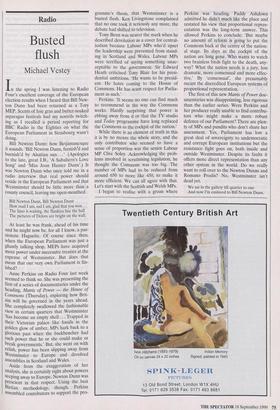Radio
Busted flush
Michael Vestey
In the spring I was listening to Radio Four's excellent coverage of the European election results when I heard that Bill New- ton Dunn had been returned as a Tory MEP. Scents of foie gras and butter-soaked asparagus festivals had my nostrils twitch- ing as I recalled a period reporting for BBC Radio in the Eighties on what the European Parliament in Strasbourg wasn't doing.
Bill Newton Dunn: how Betjamanesque it sounds. 'BiII Newton Dunn, furnisni and burnish'd by Alsatian sun ... ' (Apologies to the late, great J.B., 'A Subaltern's Love Song' and 'Miss Joan Hunter Dunn'.) It was Newton Dunn who once told me in a radio interview that real power should reside in the European Parliament and that Westminster should be little more than a county council, leaving me open-mouthed.
Bill Newton Dunn, Bill Newton Dunn How mad I am, sad I am, glad that you won .. The limo is waiting, the flunkies line the hall The pictures of Delors are bright on the wall.
At least he was frank, ahead of his time and he might now be, for all I know, a pas- sionate Hagueite. Of course since then, when the European Parliament was just a ghastly talking shop, MEPs have acquired more power under successive treaties at the expense of Westminster. But does that mean that our very own Parliament is fin- ished?
Anne Perkins on Radio Four last week seemed to think so. She was presenting the first of a series of documentaries under the heading, Matrix of Power — the House of Commons (Thursday), exploring how Brit- ain will be governed in the years ahead. She completely swallowed the fashionable view in certain quarters that Westminster has become an empty shell ... Trapped in their Victorian palace like fossils in the golden glow of amber, MPs hark back to a glorious past when the backbencher had such power that he or she could make or break governments.' But, she went on with relish, power has been slipping away from Westminster to Europe and devolved assemblies in Scotland and Wales.
Aside from the exaggeration of her analysis, she is certainly right about powers seeping away to Europe. Newton Dunn was prescient in that respect. Using the best Birtian methodology, though, Perkins assembled contributors to support the pro- gramme's thesis, that Westminster is a busted flush. Ken Livingstone complained that no one took it seriously any more, the debate had shifted to television.
Tony Benn was nearer the mark when he described devolution as a cover for central- isation because Labour MPs who'd upset the leadership were prevented from stand- ing in Scotland and Wales. Labour MPs were terrified of saying something unac- ceptable to the government. Sir Edward Heath criticised Tony Blair for his presi- dential ambitions. 'He wants to be presid- ent. He hates coming to the House of Commons. He has scant respect for Parlia- ment as such.'
Perkins: 'It seems no one can find much to recommend in the way the Commons works. Hardly surprising that power is ebbing away from it or that the TV studio and Today programme have long replaced the Commons as the cockpit of the nation.'
While there is an element of truth in this it is by no means the whole story, and the only contributor who seemed to have a sense of proportion was the senior Labour MP Clive Soley. Acknowledging the prob- lems involved in scrutinising legislation, he thought the Commons was too big. The number of MPs had to he reduced from around 650 to more like 450, to make it more efficient. We can all agree with that. Let's start with the Scottish and Welsh MPs.
I began to realise with a groan where Perkins was heading. Paddy Ashdown admitted he didn't much like the place and restated his view that proportional repres- entation was the long-term answer. This allowed Perkins to conclude: 'But maybe no amount of reform is going to put the Commons back at the centre of the nation- al stage. Its days as the cockpit of the nation are long gone. Who wants to watch two brainless birds fight to the death, any- way? What the nation needs is a jury, less dramatic, more consensual and more effec- tive.' By 'consensual', she presumably meant the discredited European systems of proportional representation.
The first of this new Matrix of Power doc- umentaries was disappointing, less rigorous than the earlier series. Were Perkins and her producer really unable to find contribu- tors who might make a more robust defence of our Parliament? There are plen- ty of MPs and pundits who don't share her assessment. Yes, Parliament has lost a great deal of sovereignty to undemocratic and corrupt European institutions but the resistance fight goes on, both inside and outside Westminster. Despite its faults it offers more direct representation than any other system in the world. Do we really want to roll over to the Newton Dunns and Romano Prodis? No, Westminster isn't dead yet.
We sat in the gallery till quarter to one And now I'm enslaved to Bill Newton Dunn.


























































































 Previous page
Previous page